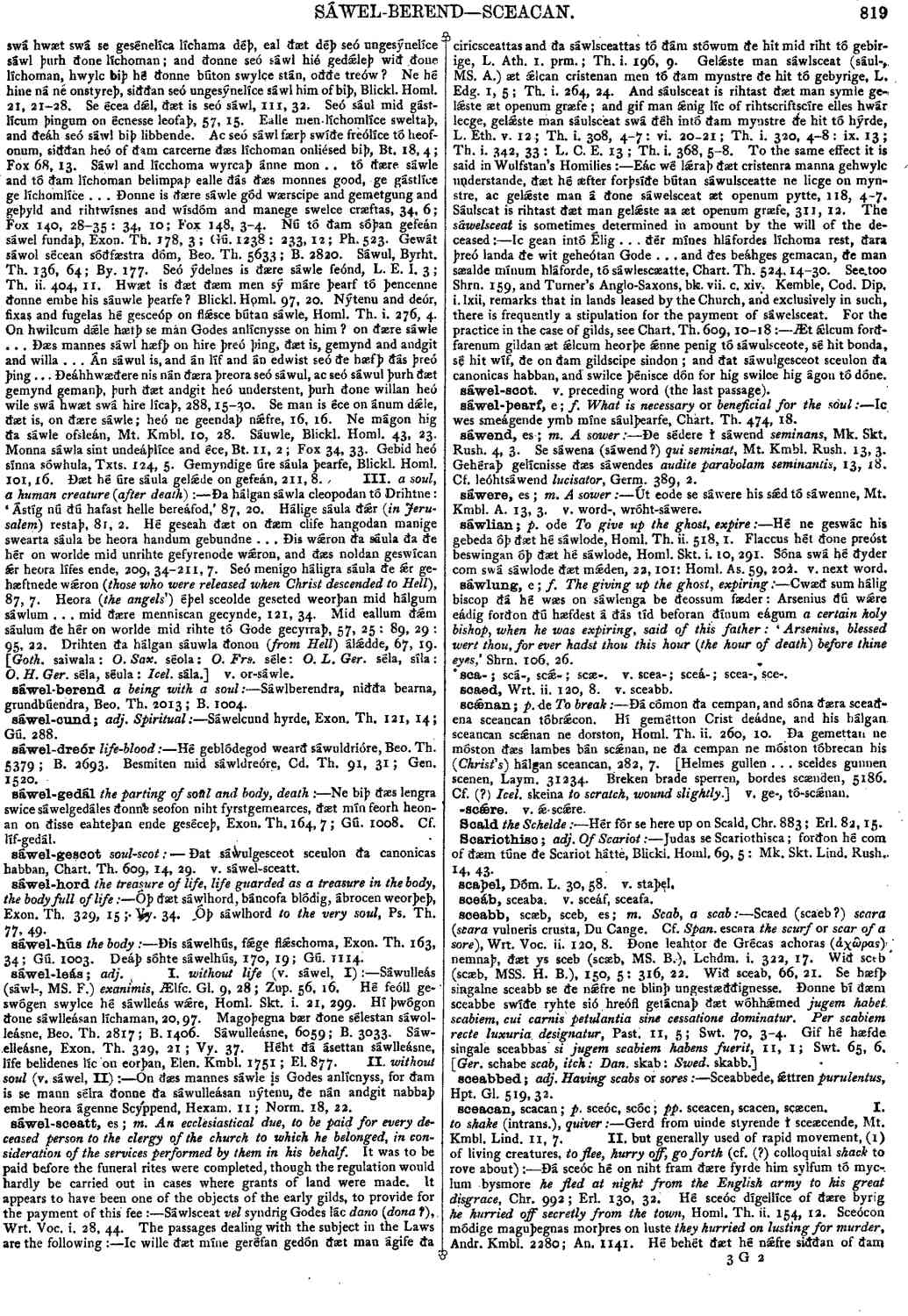sceacan
- verb [ strong ]
-
Gerd from uinde styrende ł sceæcende,
- Mt. Kmbl. Lind. 11, 7.
-
Ðá sceóc hé on niht fram ðære fyrde him sylfum tó myclum bysmore
he fled at night from the English army to his great disgrace,
- Chr. 992; Erl. 130, 32.
-
Hé sceóc dígellíce of ðære byrig
he hurried off secretly from the town,
- Homl. Th. ii. 154, 12.
-
Sceócon módige maguþegnas morþres on luste
they hurried on lusting for murder,
- Andr. Kmbl. 2280; An. 1141.
-
Hé behét ðæt hé nǽfre siððan of ðammynstre sceacan nolde
he promised that he would not leave the monastery in a hurry again,
- Homl. Th. ii. 176, 28.
-
Hwí woldest ðú sceacan bútan mínre gewitnisse
cur ignorante me fugere voluistil?
- Gen. 31, 27.
-
Deófol ongon on fleám sceacan,
- Exon. Th. 280, 17; Jul. 630; Judth. Thw. 25, 34; Jud. 292.
-
Hí gewiton in forwyrd sceacan
they hurried to perdition,
- Andr. Kmbl. 3187; An. 1596.
-
On gerúm sceacan,
- Exon. Th. 401, 20; Rä. 21, 14.
-
On lyft scacan, fleógan ofer foldan,
- Cd. Th. 280, 32; Sat. 263; Beo. Th. 3610; B. 1803.
- [Nes þer nan biscop ꝥ forð on his wæi ne scoc, naa]
-
Hwílum hára scóc forst of feaxe
at times the hoar frost was thrown from my hair,
- Exon. 498, 26; Rä. 88, 7.
-
Strǽla storm, strengum gebǽded, scóc ofer scyldweall,
- Beo. Th. 6227; B. 3118.
-
Ðonne mín sceaceþ líf of líce
when my life takes flight from the flesh,
- Beo. Th. 5478; B. 2742; Exon. Th. 327, 4; Wíd. 141.
-
Swǽ giémeleáslíce oft sceacaþ úre geþohtas from ús ðæt wé his furðum ne gefrédaþ
curae vitae ex sensu negligenti quasi nobis non sentientibus procedunt,
- Past. 18, 7; Swt. 138, 20.
-
Seó tíd gewát sceacan
time passed on.
- Cd. Th. 9, 2; Gen. 135.
-
Is nú worn wintra sceacen,
- Elen. Kmbl. 1263; El. 633.
-
Ðá wæs dæg sceacen,
- Beo. Th. 4602; B. 2306, 5448; B. 2727.
-
Ðá wæs winter scacen,
- 2277; B. 1136.
-
Wæs hira blǽd scacen
their glory had departed,
- 2253; B. 1124.
-
Biþ se wén scæcen,
- Exon. Th. 50, 23; Cri. 805.
-
Biþ his líf scæcen,
- 329, 25; Vy. 39.
-
Biþ týr scecen,
- 447, 27; Dóm. 45.
-
Ic sceace (scace, scæce)
concutio,
- Ælfc. Gr. 28, 4; Zup. 169, 7.
-
Gúðweard gumena wælhlencan sceóc,
- Cd. Th. 188, 31; Exod. 176.
-
Sceacas (scæcas, Rush.) ðæt asca of fótum iúrum
excubite te pulverem de pedibus vestris,
- Mk. Skt. Lind. 6, 11.
-
Wæs sceacen
vibratur,
- Germ. 401, 47.
-
Scecen wé plumemus (cf. windan plumemus, 83, 78;
plumarium opus
dicitur quod ad modum plumarum texitur, Du Cange),- Wrt. Voc. ii. 66, 80.
Bosworth, Joseph. “sceacan.” In An Anglo-Saxon Dictionary Online, edited by Thomas Northcote Toller, Christ Sean, and Ondřej Tichy. Prague: Faculty of Arts, Charles University, 2014. https://bosworthtoller.com/26487.
Checked: 0